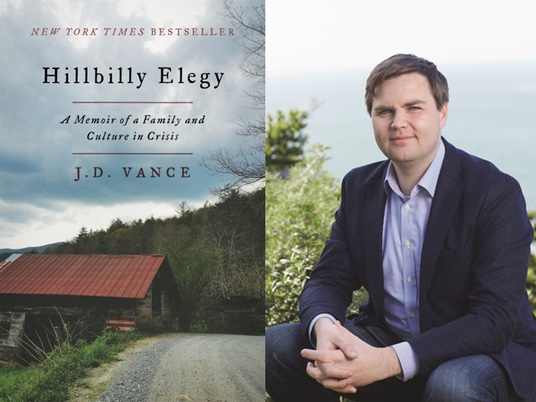
If you — like me — have, for one reason or another, put off reading J.D. Vance’s masterwork of cultural criticism, Hillbilly Elegy: A Memoir of Family and Culture in Crisis, I would strongly suggest you do so no longer. The book is even superior to all of the media hype surrounding it since its publication last June. Profane, buy not gratuitously so, very often hilarious, Vance can cuss up a storm — but then, he got it honest from his Scots-Irish relatives in Middletown, OH, by way of the small town of Jackson, in southeastern Kentucky. Hillbillies, probably more than any other American group, are peripatetic, moving away from their roots for better economic opportunities, but returning to them with regularity. Vance was born into such a family.
In many cases, those in possession of an authentic voice either cannot (or, for a myriad of reasons, do not) write; and, conversely, those who can write often do not have an authentic voice. It’s one thing to learn about the sociology of a distinct subset of Americans — in this case hillbillies — from a textbook, but quite another to learn about the culture from an actual hillbilly, albeit a highly educated and successful one. Yale Law School doesn’t graduate any dummies.
I can imagine that Vance has received, at the very least, some visual daggers pointed in his direction by his kith and kin (maybe I should be upset since the entomology of my surname is Scots-Irish), and perhaps some actual threats of violence made against him for “airing dirty laundry” in print by some others. The genius of the book is its direct honesty, at least from one man’s perspective, and that’s always going to piss some folks off, no matter the veracity.
This book resonated with me on such a deep level simply because at many points the author could have substituted the word “black” for “hillbilly,” so similar are the pathologies affecting both groups. The generation after generation of dysfunction, the stubborn pride in gross stupidity and the almost complete lack of upward mobility by some members of each of these disparate groups proves that there is nothing inherently wrong with either of them, but rather that something is wrong with our approach to formulating solutions for the most disadvantaged among us.
But make no mistake, Vance is a conservative Republican (albeit a truly compassionate one, as opposed to the other kind) at heart and therefore is real big on personal responsibility, but hell, so am I. But he — again, similar to myself — also knows that to demand personal responsibility of folks that the deck has been stacked against for centuries is somewhat cruel and patently disingenuous.
Have governmental programs that were designed to lift folks out of poverty too often had the opposite effect of reinforcing those conditions and making them generational? Of course they have. We all know of some folks or families that are mired in low goals and poverty and stuck in public housing — just like their parents were before them and their children will be after them. But we also should know that when programs were put into place to solve their problems, they were too quickly abandoned at the first sign of failure.
Drawing on personal experiences Vance explained the Trump phenomenon even before it happened: The feelings of the hill folk (and other whites throughout the Rust Belt and beyond) who complained they were getting the shitty end of the stick — and that “guvment” was to blame. They disliked Obama because of his polish, and hated his wife for telling them they were killing their kids with sugary snacks — because deep down in their heart of hearts they know she’s right.
The characters in this true story are so finely drawn you can see them in your mind’s eye. From his addicted mother, to his pistol-toting grandmother, to his grandfather and the other men that routinely rotated in and out of his fractured life, you can’t invent characters like the ones that inhabit the pages of this gripping tale.
Rumor has it that Vance is headed to Columbus to establish a nonprofit to impact on the problems of the folks he grew up around and so dearly loves. I wish him godspeed in his efforts, and his timing might prove to be politically impeccable. As a conservative Republican, he just might catch the eye and ear of Donald Trump, who just might put some real dollars into the effort, which just might prove to be so successful that it would have a spillover effect of solving the deep-seated problems of the black community also. I know that nothing would make J.D. Vance happier.

From Cool Cleveland correspondent Mansfield B. Frazier mansfieldfATgmail.com. Frazier’s From Behind The Wall: Commentary on Crime, Punishment, Race and the Underclass by a Prison Inmate is available in hardback. Snag your copy and have it signed by the author at http://NeighborhoodSolutionsInc.com
2 Responses to “BOOK REVIEW: J.D. Vance’s ‘Hillbilly Elegy’ reviewed by Mansfield Frazier”
ARNIE HENDERSON
Mr Mansfield I finally read JDs book also. I lived the “moved north Hillbilly experience as well”. Fully agree with with what you write about us Briars and Blacks (could have substituted the word “black” for “hillbilly,”). You be absolutely right sir. I saw the same things he writes about over and over growing up as one of the Hillbillies in Mansfield. The one thing I dont remember is any more than a few Welfare Trash Hillbillies. If someone was laid off their main conversation was “who is hiring” For me I am proud to be a product of that environment. What say you Mr. Mansfield: if you read this. I know your last name is Frazier but I could not resist the Olive Hill Ky sometimes custom of using Mr. or Miss with the first name.
Jane Delaney
After 75 yrs. I can finally understand, know I wasn’t the only person growing up in a dysfunctional household & truly connected with this book. J.D. Vance put so many life long issues in to proper perspective of the fear, stress, anxiety & trepidation of wanting to be home. As did Vance I had a safety net with Grandparents. Always having a tiny pink suitcase under my bed to escape. Escape from violent fights, screaming, yes throwing plates, cups or whatever to cause harm. And…yes this environment affects every aspect of a child’s life. I am grateful for this book in so many ways.